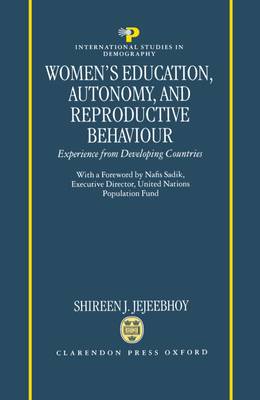
- Afhalen na 1 uur in een winkel met voorraad
- Gratis thuislevering in België vanaf € 30
- Ruim aanbod met 7 miljoen producten
- Afhalen na 1 uur in een winkel met voorraad
- Gratis thuislevering in België vanaf € 30
- Ruim aanbod met 7 miljoen producten
Zoeken
Women's Education, Autonomy, and Reproductive Behaviour
Experience from Developing Countries
Shireen J Jejeebhoy
€ 93,95
+ 187 punten
Omschrijving
Women's access to education has been recognized as a fundamental right. At the national level, educating women results in improved productivity, income, and economic development, as well as a better quality of life, notably a healthier and better nourished population. It is important for all kinds of demographic behavior, affecting mortality, health, fertility, and contraception, The personal benefits that women attach to education vary widely according to region, culture, and level of development, but it is clear that education empowers women, providing them with increased autonomy and resulting in almost every context in fewer children. Beyond these few general assertions, however, there is little consensus on such issues as how much education is required before changes in autonomy or reproductive behavior occur; whether the education-autonomy relationship exists in all cultural contexts, at all times, and at all levels of development; and which aspects of autonomy are important in the relationship between education and fertility. It is in the need to address these fundamental issues that this book took shape. The author reviews the considerable evidence about education and fertility in the developing world that has emerged over the last twenty years, and then passes beyond the limits of previous studies to address three major questions: BL Does increased education always lead to a decrease in the number of children, or is there a threshold level of education that a woman must achieve before this inverse relationship becomes apparent? BL What are the critical pathways influencing the relationship of women's education to fertility? Is fertility affected because education leads to changes in the duration of breast-feeding? Because it raises the age at marriage? Because it increases the practice of contraception? Or because education reduces women's preferences for large numbers of children? BL Do improvements in education empower women in other areas of life, such as their improving exposure to information, decision-making, control of resources, or confidence in dealing with family and the outside world? Supported by full documentation of the available survey data, this study concludes that such contextual factors as the overall level of socio-economic development and the situation of women in traditional kinship structures complicate the general assumptions about the interrelationships between education, fertility, and female autonomy. It lays out the policy implications of these findings and fruitful directions for future research.
Specificaties
Betrokkenen
- Auteur(s):
- Uitgeverij:
Inhoud
- Aantal bladzijden:
- 324
- Taal:
- Engels
- Reeks:
Eigenschappen
- Productcode (EAN):
- 9780198290339
- Verschijningsdatum:
- 1/02/1996
- Uitvoering:
- Hardcover
- Formaat:
- Genaaid
- Afmetingen:
- 162 mm x 244 mm
- Gewicht:
- 675 g

Alleen bij Standaard Boekhandel
+ 187 punten op je klantenkaart van Standaard Boekhandel
Beoordelingen
We publiceren alleen reviews die voldoen aan de voorwaarden voor reviews. Bekijk onze voorwaarden voor reviews.











